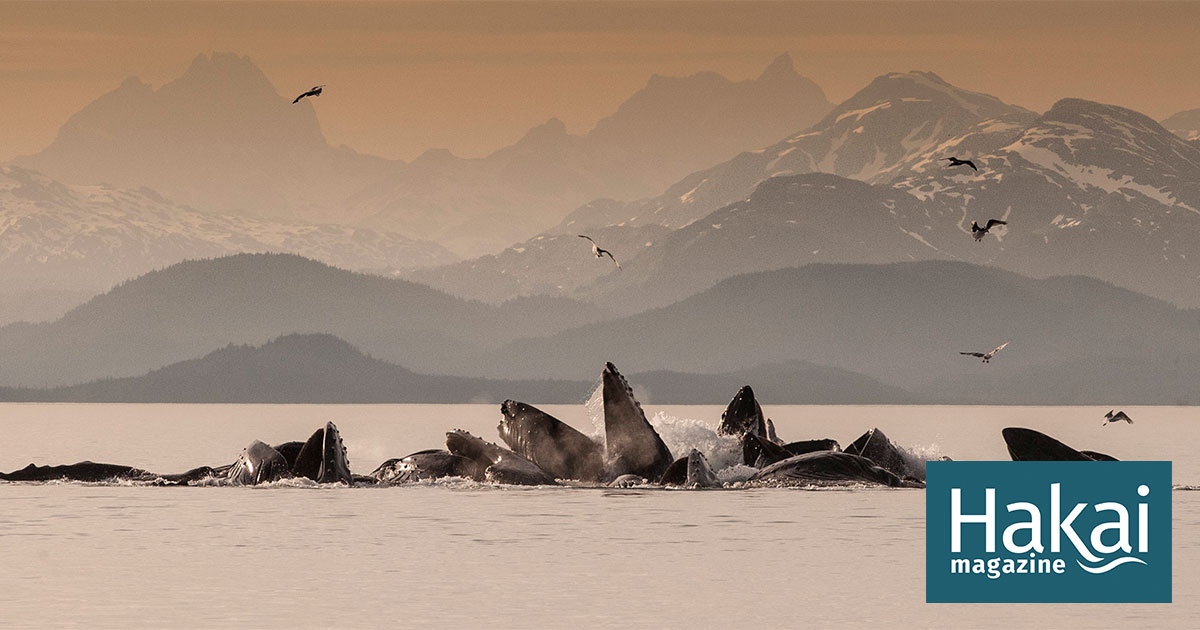In the Absence of Cruise Ships, Humpbacks Have Different Things to Say
Physique of the article
On the night of March 13, 2020, Michelle Fournet, like so many others, ready for lockdown. However whereas she was packing up her workplace at Cornell College in Ithaca, New York, she realized that the upcoming quarantine may supply her a once-in-a-lifetime alternative. An knowledgeable on marine mammal communications, particularly humpback whales in Alaska’s busy Glacier Bay Nationwide Park, Fournet noticed that the sudden shutdown of the Alaskan cruise business supplied a possibility to see humpback whales vocalize in an ocean with out these giant ships. Trapped in New York, she urged her colleagues in Alaska to sink a hydrophone in the identical spot the place she recorded whales in the summertime of 2019.
Fournet spent the winter and spring listening to the hydrophone recordings and evaluating them with these of the earlier 12 months. Evaluation reveals that even with out cruise ships, the humpback whales made roughly the identical variety of kinds of calls. However their first knowledge, which has but to be launched, reveals one main change: the humpback whales made a sure kind of name that they seek advice from as wup a lot much less usually.
In the summertime of 2019, round 66 p.c of humpback whale calls have been lashes. In 2020, when the typical noise stage was thrice decrease, whale frequency dropped under 50 p.c.
Fournet additionally in contrast her name log with recordings of humpback whales made by researcher Roger Payne in 1976, who was finding out the whales in close by Frederick Sound. The proportions of the strikes on this 45-year-old recording, taken with out boats, are just like their 2020 recordings, in line with Fournet.
Fournet’s discovering is among the many earliest outcomes of research utilizing what is named anthropause – a reputation coined for the sudden slowdown or cessation of human exercise around the globe attributable to COVID-19 lockdowns – that focus on the extra delicate results of noise air pollution to point marine life.
For probably the most half, researchers do not know what every kind of humpback whale vocalization really means. Nevertheless, based mostly on her earlier work, Fournet believes that whipping is a type of contact name for the humpback whales in Glacier Bay. “It is a means of asserting their presence,” says Fournet. This may help them maintain their distance whereas they feed on capelin, sand lance, and different fish.
If this interpretation is appropriate, the prevalence of strikes within the no-pandemic interval means that cruise ship noise might have an effect on humpback whales’ desk manners.
Scientists know that publicity to noise could make it troublesome for marine animals to listen to one another, discover meals and navigate, and may also harm listening to. Nevertheless, Fournet says they’re solely simply starting to delve into the extra delicate results, corresponding to how altering the proportion of calls might have an effect on the standard of interactions.
Paul Spong and Helena Symonds, who run OrcaLab, a whale analysis station off the east coast of Vancouver Island in British Columbia that cruise ships cross by on their means from Seattle, Washington, to Glacier Bay, noticed a much less pronounced anthropause with boat visitors and different noise makers. However they have been given respite from cruise traces, Spong says, which may drown out the whole lot else for an hour as they go by. With out being within the water, he says, “It was simply good to pay attention [the whales]. “
Spong and Symonds didn’t affiliate particular hump vocalizations with particular meanings in British Columbia. Nevertheless, Symonds says OrcaLab is one among a number of analysis facilities to have put in a coordinated community of recent hydrophones alongside the coast of British Columbia in 2020. When cruise ship exercise picks up once more, they’ll evaluate their data of ambient noise in 2020, business and whales within the years after the pandemic. “I feel any noise within the sea, particularly a number of noise, disturbs the habits,” says Spong.
However even when researchers can detect vital modifications in hump vocalizations within the face of ship noise, it’s troublesome to hyperlink this knowledge to social influence. Jackie Hildering, co-founder of the Marine Schooling and Analysis Society in Port McNeill, British Columbia, explains one cause: The that means of calls can range relying on what the whale is doing, the place it’s and, most significantly, who’s making it.
“People do various things somewhere else,” explains Hildering. A broader cultural context, such because the identities, relationships or migration routes of whales, is important to grasp a specific name – or the consequences of modifications in these calls brought on by noise air pollution.
Fournet is now working to establish the social context of the sounds made by the whales in Glacier Bay. She correlates her hydrophone recordings with observations by her colleague Christine Gabriele from the US Nationwide Park Service, which present what the whales do after they make a sure noise.
Fournet hopes that as the information additional quantifies these modifications, the information will reveal not solely how the whales vocalized in another way in the course of the anthropause in Glacier Bay’s distinctive theater, but in addition what they have been saying.
[ad_2]

